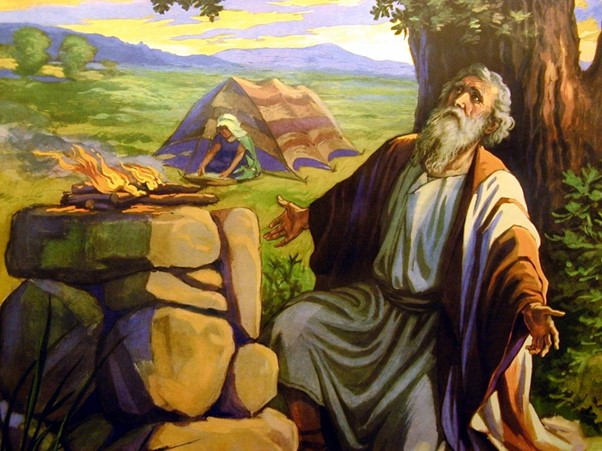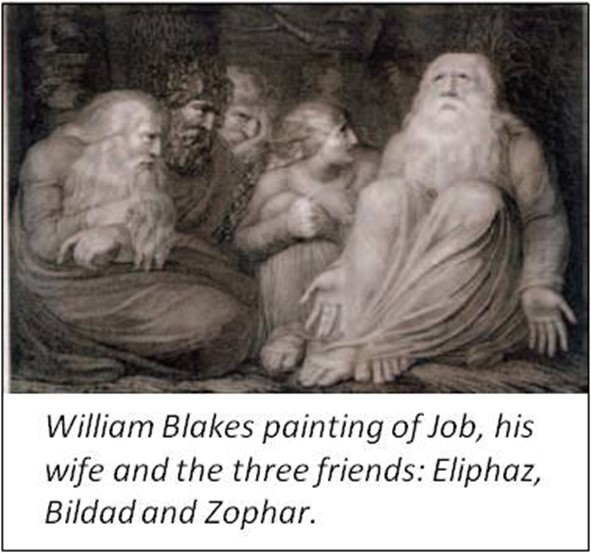
Have You Considered My Servant Job’
 The book of Job is deemed to be one of the oldest documents in existence and Job himself may have been contemporary with Abraham. Though Job was undoubtedly a real, historical figure, the writer presents a major episode in his life in the form of a play.
The book of Job is deemed to be one of the oldest documents in existence and Job himself may have been contemporary with Abraham. Though Job was undoubtedly a real, historical figure, the writer presents a major episode in his life in the form of a play.
Two Challenges
➊ At that time it was assumed that good citizens are blessed by God with excellent health, high esteem and wealth. The book of Job challenges that assumption.
The same wrong assumption can be found in the New Testament. When confronted with a man who was born blind the disciples of Jesus had a problem:
“Rabbi,” they asked Jesus, “who sinned, this man or his parents, that he was born blind?” (John 9:2).
They assumed that it must be somebody’s fault! Even today the same views are lurking around. “I don’t know what I’ve done to deserve this!” can be the reaction to adverse circumstances.
➋ The book of Job also examines the question of forgiveness in a way which anticipates the teaching of Jesus.
Three supposed friends of Job appear on the scene. In spite of all the cruel words they heaped onto the head of Job, he was able to find it in his heart to show a forgiving spirit. Job remembered his friends in his prayers to God. In this way his prayers became medicine for his own soul; bitterness, anger and revenge were excluded by the greater power of forgiveness.
The Drama Unfolds
Act 1: (Job chapter 1 and 2:1–10)
We are introduced to Job as a “blameless and upright” man. He was extremely wealthy and had brought up his children to be God-fearing citizens; he enjoyed great status in his community.
his children to be God-fearing citizens; he enjoyed great status in his community.
On one occasion, Job was holding a religious gathering but a character named ‘Satan’ also attended. (The writer introduces this character to give voice to the unspoken words of some of Job’s friends who were jealous of him and were thinking that if God had blessed them with great wealth, they could afford to be God-fearing people too.) The Almighty was also present at the gathering.
God gave ‘Satan’ the power to severely test Job and so a series of disasters befell him destroying much of his wealth and leaving him in a pitiful state due to painful sores which caused relentless itching. Would he still be “godly and upright”? Even his wife appeared to turn against him, “Curse God and die” was her advice.
But Job’s trust in God was unshakeable – although even he was totally bewildered. “Why, why, why is God dealing with me like this?” he asked, and he had no answer so he wished that he could die.
Act 2: (Job 2:11–32:1)
Three friends arrive to express their sympathy with Job but it soon becomes clear that privately they derive some satisfaction from the downfall of this great man. To them the explanation is clear – in spite of all appearances to the contrary, Job must have been a wicked man because everyone knows that God brings misfortunes on the wicked. In a long series of speeches they mercilessly rub their increasingly cruel words into Job, thus exacerbating his anguish. These are some of the things they say:
“Even as I have seen, those who plow iniquity and sow trouble reap the same” (Job 4:8);
“How long will you speak these things, and the words of your mouth be like a strong wind?” (Job 8:2);
“Know therefore that God exacts from you less than your iniquity deserves” (Job 11:6).
Job resolutely denies that his life has been tainted with wrong-doing in any way and the only explanation he can think of is that God has somehow got His facts wrong and that the whole thing is the result of a most unfortunate misunderstanding. If only Job could have the opportunity to present his case to God then this misunderstanding would soon be cleared up.
We note that Job is thinking of God very much in human terms. Eventually the three friends give up, concluding that Job’s self-righteousness cannot be shaken (Job 27:6 and 32:1).
Act 3: (Job 32:2–37:24)
At this point a young man called Elihu comes forward and he is very angry: angry with Job because he deems himself to be more righteous even than the Almighty, but also angry with the three friends because their thinly veiled gloating over Job’s misfortunes is so offensive.
Furthermore he holds that their conclusions are wrong and their condemnation of Job totally unjustified.
Elihu then turns to Job and rebukes him for having criticised the Almighty.
“Look, in this you are not righteous. I will answer you, for God is greater than man” (Job 33:12).
That really is the final answer – that neither Job nor we ourselves, can be greater than God and nor do we have the right to demand an explanation from God concerning His actions. Elihu goes on to draw Job’s attention to the greatness of God:
“Behold, God is great, and we do not know Him; nor can the number of His years be discovered” (Job 36:26).
Elihu’s final words to Job are these:
“As for the Almighty, we cannot find Him; He is excellent in power, in judgment and abundant justice; He does not oppress. Therefore men fear Him; He shows no partiality to any who are wise of heart” (Job 37:23–24).
A great whirlwind is approaching.
Perhaps this represents the turmoil in Job’s mind as he tries to come to terms with the fact that his presuppositions have been totally wrong and that he must acknowledge his own human littleness in the presence of his Maker.
Act 4: (Job 38:1–41:34)
The voice of the Almighty Himself now arises out of the whirlwind, as He asks:
“Who is this who darkens counsel by words without knowledge? (Job 38:2).
He then draws Job’s attention to a catalogue of marvels in creation which surround us all but which, like Job, we tend to ignore:
“Where were you when I laid the foundations of the earth?” (Job 38:4)
“Can you bind the cluster of the Pleiades, or loose the belt of Orion?” (38:31)
“Who provides food for the raven, when its young ones cry to God, and wander about for lack of food?”
(38:41)
“Do you know the time when the wild mountain goats bear young? Or can you mark when the deer gives birth?” (39:1–2)
“Does the eagle mount up at your command, and make its nest on high?” (Job 39:27)
Such examples of Divine creation are drawn to Job’s attention – and they could be multiplied many times over.
Where were we when God created the spiders with their miraculous webs; when God created tiny birds with the ability to navigate over thousands of miles; when God created ants with their highly organised communities…?
Do we marvel at these everyday things, giving glory to the Creator, or do we mutter ‘evolution’, thus ignoring the evidence of the Creator’s handiwork?
Job is now humble enough to acknowledge his own arrogance:
“I know that You can do everything, and that no purpose of Yours can be withheld from You. You asked, ‘Who is this who hides counsel without knowledge?’ Therefore I have uttered what I did not understand, things too wonderful for me, which I did not know … Therefore I abhor myself, and repent in dust and ashes” (Job 42:2–3,6).
Act 5: Job 42:7–17
The three friends now return to the centre of the stage feeling very contrite for the cruel and grossly unfair words which they have aimed at Job. They are rebuked by the Almighty and they are given a piece of information:
“My servant Job shall pray for you”.
Job does indeed pray for his friends. Remembering his own need for forgiveness he finds it possible to forgive the friends for all the cruel things they have said.
And the Lord restored Job’s losses when he prayed for his friends. Indeed the Lord gave Job twice as much as he had before (Job 42:10).
Thus the book of Job, written so early in Bible history, anticipated the teaching of Jesus, who said:
“Love your enemies, bless those who curse you, do good to those who hate you, and pray for those who spitefully use you and persecute you” (Matthew 5:44).
Job did that brilliantly and so should we if we want to be part of God’s new world when Job and other faithful believers will be raised from the dead to start life anew.
By David Budden
![]()
